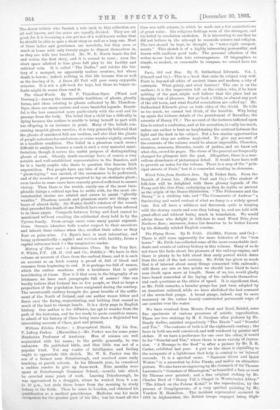The Ghost-World. By T. F. Thiselton-Dyer. (Ward and Downey.)—Among the
innumerable traditions of ghosts, ghostly forms, and ideas relating to ghosts collected by Mr. Thiselton- Dyer, there are many curious and some beautiful legends. Beauti- ful is the lore connected more particularly with the soul and its passage from-the body. The belief that a child has a difficulty in dying because the mother is unable to bring herself to part with her offspring is an instance in point. Many of the beliefs con- cerning unquiet ghosts survive ; it is very generally believed that the ghosts of murdered folk are restless, and also that the ghosts of people notorious for misfortune or crime wander nightly, usually in a headless condition. The belief in a phantom coach seem s difficult to analyse, because a coach is such a very material mani- festation, though it serves the useful purpose of distinguishing ghosts of rank. Ghostly death-warnings have, of course, a very notable and well-established representative in the Banshee, and he is a hardy sceptic who dares to question this famous Irish superstition. Few people have any idea of the lengths to which " ghost-laying " was carried, of the ceremonies to be performed, and of the number of parsons required to lay an obstinate ghost ; even twelve in some cases have scarcely proved sufficient to ensure victory. Then there is the wraith, surely one of the most inex- plicable things a critical age has to settle with, for the most cir- cumstantial stories are related and sworn to anent "ghostly wraiths." Phantom sounds and phantom music are things one hears of almost daily. Sir Walter Scott's relation of the sounds that preceded the death of one Bullock have recently been referred to in these pages. Compacts between living and dead cannot be mentioned without recalling the celebrated story held to by the Tyrone family. From savage races come many quaint supersti- tions. Oceanic islanders both render respect to their ancestors and inherit their virtues when they swallow their ashes as they float on palm-wine. Mr. Dyer's book is most interesting, and being systematically cr mpiled and written with lucidity, forms a capital reference-book f r the imaginative reader.


































 Previous page
Previous page